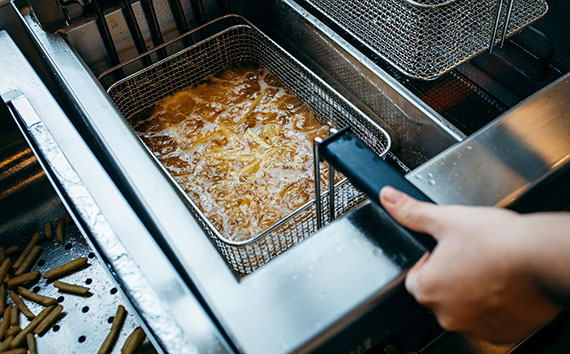FOG Compliance for Food Service Establishments
About the FOG Compliance Program
Help us protect our sewers! This compliance program, managed by Aquarion Water Company, helps prevent sewer blockages caused by fats, oils, and grease (FOG). It applies to Class III & IV Food Service Establishments (FSEs). Affected FSEs must install and maintain grease removal equipment and follow Best Management Practices (BMPs). Learn about requirements and compliance here.

What is FOG and why does it matter?
Fats, Oils, and Grease (FOG) are a byproduct of cooking, food and drink preparation, and meat preparation. FOG is generated from meat fats, shortening, butter, margarine, sauces, and dairy products. When these products are washed down the drain from cookware, utensils and other means, they can solidify and causes blockages in the sewer collection system. Raw sewage overflows result in public health risks and negative impacts to waterways.
Understanding the FOG General Permit requirements
The General Permit for the Discharge of Wastewater Associated with Food Service Establishments (“FOG General Permit”) was issued on September 30, 2005, and reissued on October 5, 2015, and expected to be reissued again some time in 2025.
The permit requires certain dischargers to municipal sewer systems to limit the amount of FOG of all Class III and IV food service discharges by installing either an outside grease trap/interceptor, an Active Grease Recovery Unit (AGRU), or Super-Capacity Grease Interceptor (SCGI) in accordance with technical requirements specified in the general permit.
Aquarion is the authorized agent for the Ansonia Wastewater System and the New Hartford Wastewater System (herein referred to as “Wastewater Operations”) and approves the FOG management equipment to be installed. Kitchen fixtures and drains as specified in the general permit shall be connected to the FOG management equipment. Pollution prevention and best management practices are also required of the permittee (owner of establishment) including documented permittee quarterly inspections of the installed equipment and pump-outs of the passive grease interceptor at least every three months. Recovered fats, oils, and grease shall be disposed of at a regional collection/transfer/disposal site.
These actions are authorized in Section 22a-430b of the Connecticut General Statutes.
Requirements for Class III or IV Food Service Establishments (FSEs)
If you are an owner (permittee) of a Class III or IV Food Service Establishment (FSE) that discharges to a sanitary sewer, you must comply with the General Permit for the Discharge of Wastewater Associated with Food Service Establishments (General Permit). This includes installing and maintaining approved grease removal devices and adhering to Best Management Practices (BMPs). Failure to comply may result in daily fines and revocation of food service licenses.
Class III and IV FSEs include but are not limited to:
- Restaurants
- Hotel kitchens
- Hospital and school cafeterias
- Taverns and cafes
- Factory cafeterias
- Church kitchens
- Bakeries
- Special club kitchens
For complete details on installation requirements, maintenance procedures, inspection protocols, and compliance enforcement, please refer to the FOG Program Policy.
What to expect during a FOG inspection
As part of the FOG Compliance Program, Aquarion will conduct inspections of all Class III and IV Food Service Establishments (FSEs) to ensure compliance with the General Permit.
- Initial inspections are scheduled during the first year of the program, with 30-day advance notice.
- Annual inspections follow for all FSEs, including those with a Diminimus Discharge designation.
- Inspection results may lead to a Pass, Fail, or Diminimus Discharge determination.
- Failed inspections must be corrected within 60 days. Continued non-compliance may be reported to CT DEEP and result in additional enforcement actions.
For complete details on inspection procedures, outcomes, and enforcement, please refer to the FOG Program Policy.
Additional resources
-
FOG FAQ for FPEs (pdf)
-
Stop the FOG Poster (pdf)
Contact Us
Call Center hours are weekdays 8:00 a.m. to 5:30 p.m. Emergency service is available for all other hours including weekends and holidays.
Contact Us